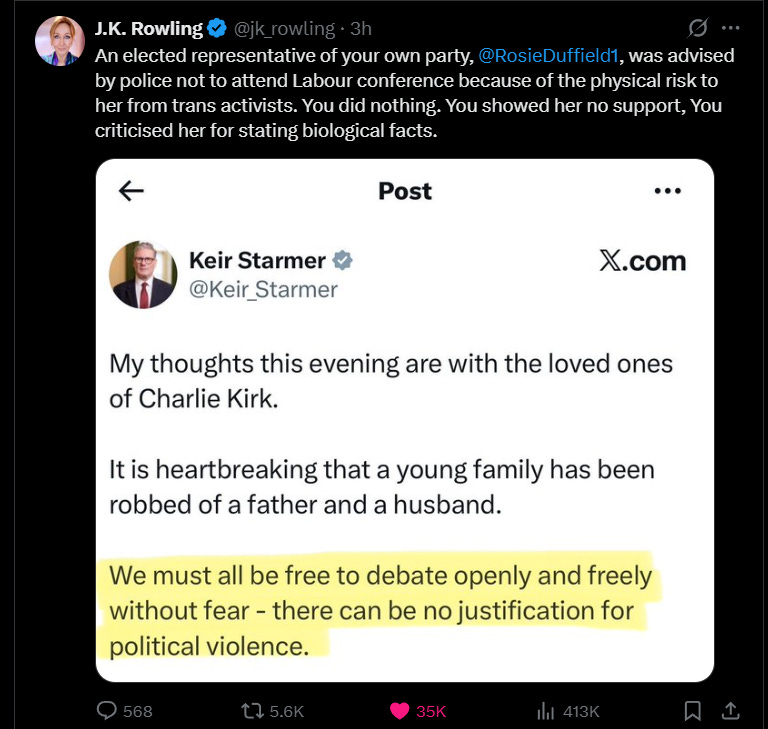Selective Courage
Why political leaders defend free speech only when it costs them nothing.
Keir Starmer’s recent statement — “We must all be free to debate openly and freely without fear – there can be no justification for political violence” — presents itself as a high-minded affirmation of liberal democracy. The words are unimpeachable. Free speech, open debate, and the rejection of violence as a political tool are foundational to any society that claims to be democratic.
Yet J.K. Rowling’s response exposes the hollowness of this rhetoric. She points to Rosie Duffield, an elected Labour MP, who was warned by police not to attend her own party’s conference due to threats from trans activists. The leadership offered her no support. Instead, Duffield was left isolated, criticized even by her colleagues, for voicing views on sex and biology that were deemed politically inconvenient.
The contrast is stark: Starmer declares the sanctity of fearless debate when it is safe and politically advantageous, but looks away when the same principle demands courage against his activist base.
Principle Without Consistency Is Posturing
A principle that is applied only when convenient is not a principle at all. It is a rhetorical shield. Starmer’s statement sounds lofty, but by ignoring Duffield’s case, he shows that his commitment to open debate is conditional — subordinated to political calculation.
Rowling’s criticism lands precisely because it weaponizes his own words against him. If it is true that there can be “no justification for political violence”, then why is silence acceptable when one of his own MPs is forced into hiding from her own party’s activists? Either the principle is universal, or it is worthless.
The Chilling Effect of Selective Courage
When intimidation goes unchallenged, the result is not merely personal cowardice but institutional rot. A political party that cannot protect dissenters within its own ranks from mob threats has abandoned the idea of open debate in practice. The signal is clear: certain viewpoints are not to be argued with, but suppressed. Fear replaces dialogue. Violence replaces persuasion.
The real test of leadership is not in condemning violence when it is easy and expected, but in defending free speech when it cuts against the grain of one’s own supporters. That is the difference between principle and opportunism.
Verdict
Rowling’s critique is not merely personal but systemic. Starmer exemplifies a broader pattern of modern politics: leaders recite universal values in public, but enforce them selectively in private. They posture as defenders of principle while quietly allowing intimidation to decide which voices are heard.
If free debate is to mean anything, it must be defended most vigorously where it is least popular. Otherwise, it is nothing more than a slogan — a virtue signal masking cowardice.



